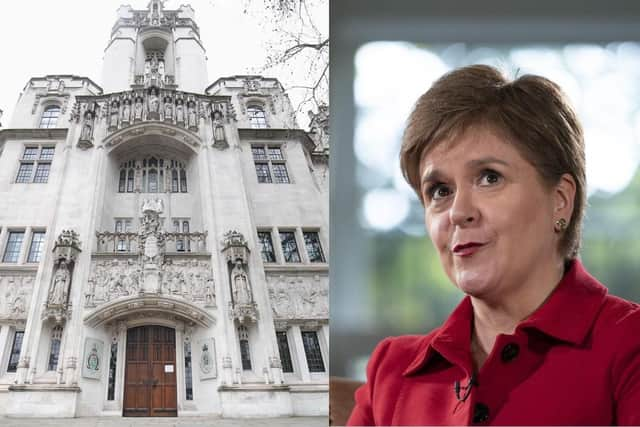Scottish independence: What is the Scottish independence Supreme Court case in October? When are the hearings and who is involved?
The UK Supreme Court said it will hold hearings in October on whether Scotland can call an independence referendum without the consent of the UK Government.
Regardless of what happens, Nicola Sturgeon intends to hold an independence referendum on October 19, 2023 as part of the SNP Government’s route map to independence.


Advertisement
Hide AdAdvertisement
Hide AdBoth Prime Minister Liz Truss and her predecessor Boris Johnson said they would not allow the poll because Scots rejected independence in a 2014 referendum that was billed as a once-in-a-generation vote.
The Scottish Government wants judges to settle whether MSPs could legislate for a vote on Scottish independence without Westminster's backing.
UK Government law officers argue this is premature, and want the case thrown out without a ruling either way.
Supreme Court judges have said they want to hear the full arguments from both sides before coming to a decision.
As wheels are beginning to be set in motion over the Supreme Court hearing, here is all you need to know about the case as the October hearings fast approach.
Arguments for
The Scottish Government published its case in August, arguing the referendum was "advisory" and would have no legal effect on the Union.
Constitutional matters, including the Union, are reserved to Westminster, but Lord Advocate Dorothy Bain has argued an "advisory" referendum would not necessarily cut across this.
The SNP have also made an attempt to intervene in the case, arguing that – as a public body – it would be "fair, just and reasonable" for the party to make arguments to the court.
Advertisement
Hide AdAdvertisement
Hide AdThe party presented its case in a 15-page submission to the court by lawyers Claire Mitchell QC and David Welsh.
The SNP argues Britain’s departure from the European Union and the coronavirus pandemic have “upended politics and the economy” and that it is time to revisit the case for independence as so much has changed since the people of Scotland previously voted on the issue.
Nicola Sturgeon has said the Scottish Parliament has an “indisputable democratic mandate” for a new independence vote.
Arguments against
The UK Government has said the Scottish Parliament does not have the power to pass a Bill to hold indyref2.
UK law officers argue the constitution is reserved to Westminster.
The UK Government's view remains that a Bill legislating for a referendum on independence would be outside the “legislative competence of the Scottish Parliament”.
Papers lodged on behalf of the Advocate General for Scotland, Lord Stewart, argue the court would not normally give "advisory opinions on abstract legal questions".
A spokeswoman for the UK Government said: "People across Scotland want both their governments to be working together on the issues that matter to them and their families, not talking about another independence referendum."
Dates for court action
Advertisement
Hide AdAdvertisement
Hide AdThe court said it will hear the oral arguments from both sides – the Scottish Government and the UK Government – on Tuesday, October 11 and Wednesday, October 12 in London.
A five-person panel has been announced to hear the matter.
Supreme Court president Lord Reed, who is a Scots lawyer, will be on the bench.
The other justices overseeing the case are Welsh judge Lord Lloyd-Jones, Northern Irish member Lord Stephens, and English judges Lord Sales and Lady Rose.
Comments
Want to join the conversation? Please or to comment on this article.
